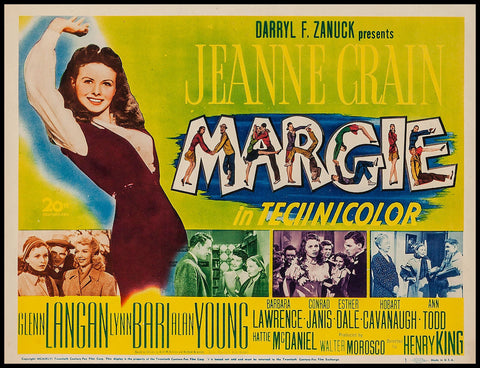Jeanne Crain

With her natural beauty and unaffected charm, the young Jeanne Crain was a breath of fresh air in 20th Century-Fox films of the 1940s. Her looks and manner became somewhat brittle as she matured, but she remained a top leading lady at Fox into the early '50s. The high point of her career was an Oscar nomination as Best Actress for “Pinky” (1949),

in which she plays a light-skinned black woman who can "pass" for white. Although director Eliza Kazan later wrote that he found her emotionally impassive as an actress, her performance remains a moving one. Kazan: "Jeanne Crain was a sweet girl, but she was like a Sunday school teacher. I did my best with her, but she didn't have any fire. The only good thing about her was that it went so far in the direction of no temperament that you felt Pinky was floating through all of her experiences without reacting to them, which is what 'passing' is."
She was born Elizabeth Jeanne Crain in Barstow, California on May 25, 1925, and grew up in Los Angeles. She studied drama at UCLA and signed with Fox at the age of 18, making her debut in an uncredited bit in “The Gang's All Here” (1943). She first attracted favorable attention as Lon McCallister's tomboyish love interest in “Home in Indiana” (1944), a horseracing story that became a big hit. After achieving star billing she had an even bigger success in “State Fair” (1945), a musical with an original Rodgers and Hammerstein score.
She was the "good girl" to Gene Tierney's evil schemer in another hit, the classic melodrama “Leave Her to Heaven” (1945),

1946 gave us the unforgettable "Margie" about a woman (Crain) who reminisces about her teenage years in the 1920s, when she fell in love with her teacher.

and when her singing voice was dubbed in the Jerome Kern musical “Centennial Summer” (1946).

She gave an especially engaging performance in “Apartment for Peggy” (1948)

as the pregnant bride of an ex-GI played by William Holden. 1949 was a good year for Crain; in addition to “Pinky” she acted in “A Letter to Three Wives”, with Oscar-winning script and direction by Joseph L. Mankiewicz, and played Lady Windermere in “The Fan”, an adaptation of a comedy of manners by Oscar Wilde, with a script co-written by no less than Dorothy Parker.
Among Crain's 23 films under her Fox contract, other notable entries included the nostalgic comedy “Cheaper by the Dozen” (1950) and its sequel, “Belles on Their Toes” (1952), in both of which she is the eldest daughter of a very large family; “People Will Talk” (1951),

a thoughtful comedy of manners in which she is again directed by Mankiewicz and sparkles opposite Cary Grant; and “The Model and the Marriage Broker” (1951), in which she is at her most beautiful and, under the sensitive direction of George Cukor, enjoys charming byplay with outstanding character actress Thelma Ritter. Crain's final film before leaving the studio was “Vicki” (1953), a remake of the 1941 mystery “I Wake Up Screaming”.
In the MGM biopic “The Joker Is Wild” (1957),

she is one of the women in the life of singer/comedian Joe E. Lewis as played by Frank Sinatra. Crain's final feature film was “Skyjacked” (1972).
She fleshed out her later career on television, landing the choice role of Daisy Buchanan in a Playhouse 90 production of “The Great Gatsby” before settling in to make appearances in various series. Sprinkled in were a couple of minor film epics made in Europe. Crain was married to Paul Brinkman and they had seven children together. She died of a heart attack, in Santa Barbara, a few months after Brinkman's death in 2003 on December 14.
